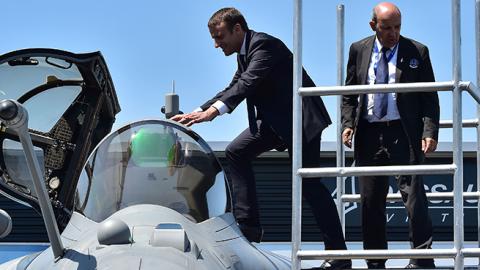p(firstLetter). “When you set out red lines, if you are unable to enforce them, then you decide to be weak,” French President Emmanuel Macron declared last summer. “Such is not my choice.” Macron’s repeated warnings that France was prepared to strike in case chemical weapons were used in Syria will be tested this week as at least 42 people have been found suffocated to death in rebel-held suburb of Douma by a chlorine like substance. On Sunday, President Donald Trump and Macron spoke on the phone and “agreed that the Assad regime must be held accountable for its continued human rights abuses.”
Trump’s promises must be considered against the background of his recently stated intention to withdraw U.S. troops from Syria as soon as possible. It’s not clear whether France can count on the United States to commit to the enforcement of any red lines against the Assad regime. But this should only concentrate Macron’s mind. If the United States abstains, he should prepare, for the sake of not only his personal credibility, but French national interests, to strike alone.
Since the beginning of his presidency, Macron has struggled to define a policy on Syria. He has generally been critical of his predecessors’ “neoconservative” interventionism, criticizing the 2011 intervention in Libya, in which France played a key role alongside the United Kingdom and the United States, and warning against the risk of failed states in the Middle-East. Macron has also rebuked the sweeping Syria policy he inherited.
Since the beginning of the uprising against Assad, France has maintained, under presidents Nicolas Sarkozy and Francois Hollande, a strong policy in favor of the departure of the Syrian dictator and in support of the opposition. As Michel Duclos, France’s former ambassador to Syria explains, France’s position lied “in a good knowledge of the nature of the Assad regime, based on a long-term experience.” French leaders had lost all trust in Damascus after years of trying to engage. Furthermore, they believed, rightly, that the regime would respond to protests with violence, fostering the rise of terrorism.
After the use of chemical weapons in Ghouta, Hollande instructed the French air force to prepare for punitive strikes against Syria’s chemical weapons command centers as well as administrative centers linked to the attacks. He assumed such an attack would be in conjunction with the United States, which had set an ultimatum concerning chemical weapons. Barack Obama’s reversal stunned French decision makers and was long a source of resentment at the Elysee. Both Hollande and Foreign Minister Laurent Fabius have indicated since then they believe that reversal was interpreted as a sign of American weakness and paved the way for Russian action in Ukraine and annexation of Crimea. After leaving office, Hollande said he was “convinced” events would have unfolded differently in Syria had the strikes been undertaken.
But the flaws of Hollande’s strategy ran deeper than Obama’s vacillation. France set maximalist demands – including the departure of Assad — but relied almost entirely on a hope that America would end up supporting its ambitions. Hollande’s last visit to Washington, to plea for a more robust intervention after the November 2015 attacks was, in this respect, an unmitigated failure. At no time did France seriously consider acting alone in 2013 after Obama’s red line was crossed.
Macron’s more limited but attainable objectives, and more importantly his determination to act upon them, are a direct result of Hollande’s experience, and reflect a realist appreciation of Washington’s limited appetite for deeper engagement. On Syria, Macron has, like Trump, prioritized the fight against the Islamic State, “our enemy,” and dropped the demand that Assad, “the enemy of the Syrian people,” should go as a prelude to a political solution. He even went as far last June as claiming that there was no “legitimate successor” to Assad.
At the same time, he has set two red lines: the use of chemical weapons against the Syrian population, and humanitarian access to Syrian civilians. After hosting the majority Kurdish Syrian Democratic Forces in Paris last month, he recently upped his ambitions, announcing the deployment of French troops in Northeast Syria to support stabilization after the fall of the Islamic State, especially in Kurdish areas threatened by Turkey. The announcement falls under the double objective of preventing the return of terrorist organizations and providing protection for the Kurds, both ambitions embraced by French public opinion.
More pertinently, these ambitions are also consistent with French interests, narrowly defined. The same would be true of a unilateral French intervention after this week’s chemical attacks.
Unilateral French strikes won’t change the balance of power in Syria; the impact of such strikes would necessarily be smaller, both militarily and politically, than U.S. action. But the French army chief of staff stated last month France had the capacity to strike “autonomously.” And punitive strikes against facilities and institutions responsible for this latest massacre would not only honor Macron commitment to act upon the use of chemical weapons, but would strengthen credibility for France’s existing commitments in Syria.
Furthermore, as Macron prepares to visit Washington on April 24 for the first state visit of Donald Trump’s presidency on a state visit to Washington later this month, French military action could earn him some much-needed favor. The two presidents have already built a strong personal relationship, exemplified by Trump’s successful visit to Paris on Bastille Day. The French have a traditionally pragmatic approach to transatlantic relations, favoring French interests rather than a value-based defense of the liberal world order. Macron has thus exploited Merkel and May’s domestic constraints, in countries where Trump is deeply unpopular, to emerge as Trump’s key European interlocutor. But the good personal relationship has so far not translated into concrete policy results. On policies relating to climate change, Jerusalem or UNESCO, Paris has not managed to influence the Trump administration.

















